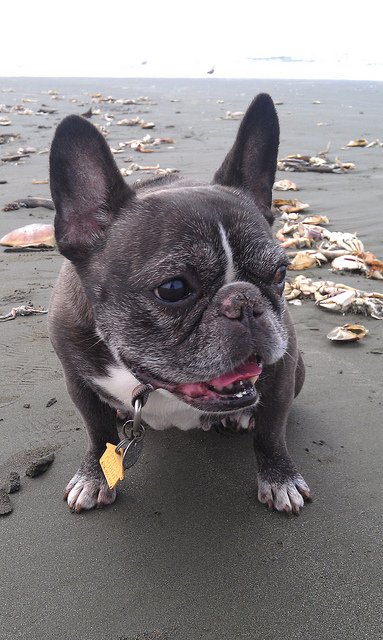What This Bulldog Can Teach You About Negotiation
I am a big believer that many people, particularly artists, already have a lot of the skills they need to negotiate. They just don’t know how they can use those skills in a negotiation.
That’s why when I teach negotiation I like using every day examples of situations where people can use those skills to get what they need out of a negotiation.
One of my favorite examples comes from an unlikely source: my French Bulldog, Josee.
If you’ve been reading this blog for a while, or if you follow me on Twitter, you know all about the ridiculousness that is Josee Lane. She’s a popular little beast.
Sadly, my time with Josee came to an end this past weekend. She was a trooper right up to the end and I feel very lucky to have had so many years with her.
I thought a fitting memorial would be teaching you the lesson that Josee has taught the hundreds of artists and freelancers who have attended my negotiation seminars.
This is Josee’s lesson:
Most People Negotiate Incorrectly
Most people negotiate by focusing on what they want. They spend a great deal of their energy on making sure they get as much of what they want (or have to give up as little of it) as earthly possible. Almost all of their decision making in the negotiation is driven by assessing whether or not they’ll get what they want.
The problem with this approach is that it just touches the surface of what’s important in negotiations. And because it’s such a shallow approach, you end up making really dumb decisions.
A common result of negotiating in this manner is that you throw out one number, the other side throws out another number and you go back and forth until you find a number somewhere near the middle that you can agree to but that isn’t really what you wanted.
This is a particularly crappy way of negotiating if you’re a freelancer because it means you start the job upset that you had to compromise so much on what you wanted. If you start upset, chances are you’re not going to get happier as the work goes on.
It’s Better to Negotiate Paying Attention to Why You Want What You Want
When you negotiate focused on why you want what you want, you open up the world of possible solutions to the negotiation. You elevate the conversation from a binary “yes” or “no” to a much more creative, and potentially satisfying exploration of “what if?”
An example is in order, because I know half of you think I’m selling unicorn kisses and fairy dust right now.
Let’s say my wife and I are talking about getting a new pet. We can’t agree on what to get. I want a French Bulldog and she’s not too sure.

If I negotiate only focused on what I want, that French Bulldog, the only to options available to her are “yes” or “no.”
I’ve limited the possibility of finding a solution I like to the same probability of a coin toss. That’s dumb.
If I negotiate by focusing on my interests, why I want what I want, I’ll probably start the conversation in the same place: I want a French Bulldog. But I’m not going to end the conversation there. I’m going to explain why.
I want a French Bulldog because they’re sweet, and lazy, and talkative, and weird, and silly, and affectionate.
By doing that I give my wife a whole lot more information about what I’m looking for in the negotiation.
Maybe she wants all of those things too and didn’t realize a French Bulldog satisfied her interests. Or maybe she knows of several other types of animals that fit my interests that I don’t know about. 
By sharing my interests and focusing on them instead of just yammering on about my position, I make my wife part of the problem solving so we can work together to settle the negotiation, instead of butting heads in opposition to one another.
I also increase the likelihood that we’ll find a solution I’m satisfied with. Instead of having to guess about why I want what I want, she has that information so she can make offers that meet my interests.
So how do you do this when negotiating with a client?
Understand why you want what you want.
Money is great, but it’s not inherently valuable. It’s valuable because it represents what we are able to do if we have it. Why $50 is important to you is probably very different from why it’s important to me.
Understand why you want the things you’re asking for in the negotiation. Does that money give you the ability to pay bills? Invest in new equipment? Go on vacation?
Don’t make the mistake of treating your rate or price as a number; it represents a lot more than that. When you understand the why behind the number, you’re better equipped to evaluate different offers and make decisions.
Explain why their offers do or don’t work for you
Negotiating can sometimes feel like throwing darts while blindfolded. Make your client a problem solving partner by giving them information about why you view their offers as good or bad.
“I can’t do the work for that price, Caitlin. It’s 35% below what I charge the client who’s been with me the longest and we have a ‘best price’ agreement. If I agreed to your price, I’d have to give them the discount as well and that’s not sustainable for my business.”
“Hank, you said something interesting about the timing of the project. If you could push this out three weeks, my schedule’s a lot more open. I could turn the project around faster if we start on the 25th instead of the 2nd.”

Josee Lane
2001-2014
By focusing on your interests, instead of your positions, you increase the likelihood of finding a satisfying and mutually beneficial result. And that means instead of having to spend your energy on contentious negotiations, you can spend it doing what you do best: wowing your clients with your skills and abilities.
Interested in taking a negotiation class from me? I’m teaching a Freelancers 360 course on how to effectively manage and negotiate with your clients on February 20th in Portland, Oregon. You can sign up here.
Finally, a special shout out of appreciation to the wonderful folks at DoveLewis Emergency Animal Hospital. They took good care of all of us Saturday night.
Categories: Negotiation Strategy




i am sorry for your loss–Josee Lane is truly a beauty and what great expression these photos show of her personality-
i would love to hear more about how her own negotiating skills had an effect on you, if any 🙂
Bull breeds like Frenchies, and Bull & Terrier breeds, like Bostons and Staffordshire Terriers, are famous for that, believe it or not…(speaking as a vet and trainer).
their wonderful hard-headed determination, their grounded sense of creature comforts and amazingly happy, positive outlook can be very instructive on their own; however negotiating is something they are great at and is so instructive, if one pays attention…
Thanks so much; she was a pretty great little monster and I was lucky to get to hang out with her for such a long time.
I think Josee’s greatest personal negotiation quality was a crystal clear understanding of what she wanted. If you could offer her (1) cuddles or (2) food, she was interested. 🙂
So sorry to hear about Josee. I loved that example in your workshop. As I remember you mentioning, it works great the other way around, too – find out why your clients want x, and you might be able to get them on board with y, which looks way better and fits their needs and intentions just as well.
Thanks, Andrea. And, yes, you’re right! Asking your clients “why?” can uncover their reasons for asking what they’ve asked for. With that information you’re in a much better position to make offers that meet their needs but don’t require you to sacrifice your sanity.